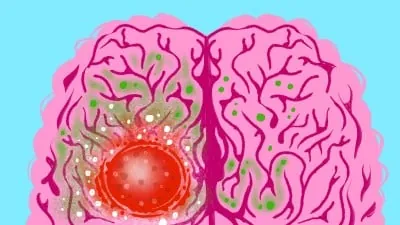
Revolutionary Dietary Changes May Hold Key to Brain Cancer Treatment
2025-09-04
Author: Mei
Glioblastomas: The Deadly Challenge
Glioblastomas are notorious for being one of the deadliest forms of malignant brain tumors. Sadly, patients diagnosed with this aggressive cancer often have a grim prognosis, surviving only one to two years on average.
The Mystery of Tumor Metabolism
New insights from a groundbreaking study published in Nature reveal that glioblastomas exhibit unique metabolic behaviors, particularly in how they utilize glucose, a vital nutrient.
Researchers at the University of Michigan, collaborating across multiple departments, aimed to uncover these differences and how they could inform more effective treatments.
Diet Changes Make a Difference for Tumors
Using mouse models, the researchers experimented with dietary modifications. Remarkably, by altering the diet, they were able to significantly slow down and even block tumor growth.
Dr. Daniel Wahl, co-senior author of the study, emphasized the potential for these findings to lead to novel treatment opportunities for patients in the near future.
Understanding Metabolic Pathways in Cancer
Traditionally, treatments for glioblastomas involve surgery, radiation, and chemotherapy, but these often lead to recurrence. The study’s findings suggest that glioblastomas metabolize nutrients differently than healthy cells—a distinction critical for developing targeted therapies.
By injecting labeled sugar into mice and human patients, researchers tracked its metabolic pathway, gaining a deeper understanding of how glioblastomas thrive.
Targeting Amino Acids for Better Outcomes
Additionally, the research uncovered that while normal brain tissue uses sugars to produce amino acids, glioblastomas bypass this route and scavenge amino acids like serine and glycine from the bloodstream.
This discovery prompted scientists to explore whether limiting these amino acids could adversely affect tumors without harming healthy brain cells.
Promising Results from Amino Acid-Restricted Diets
When mice were fed an amino acid-restricted diet, results were promising. These mice responded better to radiation and chemotherapy, and their tumors were notably smaller compared to those that received standard diets.
This indicates a potential strategy to enhance patient outcomes through dietary adjustments.
Future Clinical Trials on the Horizon
The research team is now planning clinical trials to determine if specialized diets that limit amino acids can benefit glioblastoma patients. As Dr. Wahl noted, this multidisciplinary collaboration embodies the type of innovative research necessary to advance cancer treatment.


 Brasil (PT)
Brasil (PT)
 Canada (EN)
Canada (EN)
 Chile (ES)
Chile (ES)
 Česko (CS)
Česko (CS)
 대한민국 (KO)
대한민국 (KO)
 España (ES)
España (ES)
 France (FR)
France (FR)
 Hong Kong (EN)
Hong Kong (EN)
 Italia (IT)
Italia (IT)
 日本 (JA)
日本 (JA)
 Magyarország (HU)
Magyarország (HU)
 Norge (NO)
Norge (NO)
 Polska (PL)
Polska (PL)
 Schweiz (DE)
Schweiz (DE)
 Singapore (EN)
Singapore (EN)
 Sverige (SV)
Sverige (SV)
 Suomi (FI)
Suomi (FI)
 Türkiye (TR)
Türkiye (TR)
 الإمارات العربية المتحدة (AR)
الإمارات العربية المتحدة (AR)